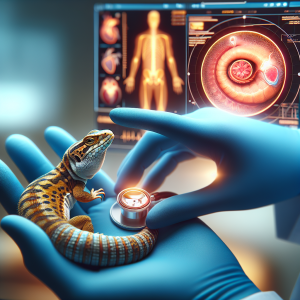Introduction: Understanding Intestinal Parasites in Lizards
Have you ever wondered how to effectively manage intestinal parasites in your beloved lizards? Well, let me share with you some valuable insights on this important topic. As one of the leading experts in the field, I have dedicated years to studying and understanding the intricacies of parasite control in reptiles.
Intestinal parasites are a common concern among lizard owners, and it’s crucial to stay informed about the various types that can affect your scaly companions. From nematodes to coccidia, these parasites can pose serious health risks if left untreated. Understanding the symptoms of infestation is key to timely intervention and treatment.
When it comes to diagnosing intestinal parasites in lizards, veterinary expertise is essential. Regular fecal tests can help identify the presence of parasites and guide the appropriate treatment plan. Remember, early detection is key to preventing complications and ensuring the well-being of your lizards.
Now, let’s delve into the fascinating world of treatment options for managing intestinal parasites. Whether it’s through deworming medications or specialized diets, there are effective ways to combat these unwelcome guests in your reptilian friends. Prevention is equally important, and maintaining a clean and hygienic living environment for your lizards can significantly reduce the risk of parasite infestations.
As we navigate the complexities of parasite control in lizards, it’s vital to consider the broader implications of our actions. By prioritizing the health and welfare of our scaly companions, we not only safeguard their well-being but also cultivate a deeper bond based on care and responsibility.
So, join me on this enlightening journey as we explore the world of managing intestinal parasites in lizards. Together, we can empower ourselves with knowledge and take proactive steps to ensure a thriving and parasite-free environment for our beloved reptilian friends.
Common Types of Intestinal Parasites in Lizards
Have you ever heard about the sneaky world of intestinal parasites that can affect our beloved lizard friends? Let me tell you, it’s a topic that’s both fascinating and crucial for every lizard owner to understand.
Imagine this: you’re spending a relaxing day with your lizard, admiring its unique features and playful antics. Suddenly, you notice some unusual symptoms like weight loss, lethargy, or changes in appetite. These could be potential signs of intestinal parasites lurking within your scaly companion.
Intestinal parasites in lizards come in various forms, from roundworms to pinworms, each with its own set of symptoms and potential risks. Identifying these parasites early is key to ensuring your lizard’s health and well-being.
Did you know that some intestinal parasites can be transmitted not only through contaminated food and water but also through direct contact with infected lizards? It’s a reminder of the importance of maintaining a clean environment and practicing good hygiene habits when caring for your scaly pals.
When it comes to diagnosing intestinal parasites in lizards, a trip to the vet is often necessary. Veterinarians can perform fecal tests to pinpoint the exact type of parasite affecting your lizard and recommend appropriate treatment options.
Here’s a practical tip: regular fecal screenings for your lizard can help detect parasites early on, allowing for prompt intervention and management. Prevention is always better than cure, right?
So, the next time you’re enjoying quality time with your lizard, keep an eye out for any unusual signs that could indicate a potential parasitic infestation. By staying informed and proactive, you can help your scaly friend stay healthy and happy for years to come.
Symptoms of Intestinal Parasites in Lizards
When it comes to symptoms of intestinal parasites in lizards, it’s crucial to pay attention to any changes in your scaly friend’s behavior. One personal anecdote that comes to mind is when I noticed my own lizard, Spike, becoming unusually lethargic and refusing to eat. At first, I thought he might just be having an off day, but as the days passed, I grew increasingly concerned.
After consulting with a reptile veterinarian, it became clear that these subtle changes in behavior were potential signs of an underlying parasitic infection. This experience highlighted the importance of being vigilant and observant when it comes to your pet lizard’s health.
Lizards, unlike other pets, cannot verbally communicate when they are feeling unwell. Instead, they rely on us to pick up on subtle cues that something may be amiss. Symptoms of intestinal parasites in lizards can manifest in various ways, including changes in appetite, weight loss, diarrhea, and lethargy.
It’s essential to monitor your lizard’s behavior closely and seek veterinary advice if you notice any concerning signs. Remember, early detection is key to effectively managing intestinal parasites and ensuring your lizard’s well-being.
By sharing this personal anecdote, I hope to emphasize the importance of being proactive and attentive to your lizard’s health. Stay tuned for more tips on how to identify and address symptoms of intestinal parasites in lizards to keep your scaly companion happy and healthy.
Diagnosis and Testing for Intestinal Parasites
As we delve into the topic of diagnosing and testing for intestinal parasites in lizards, it’s essential to understand the importance of early detection. Picture this – you’ve noticed some changes in your lizard’s behavior, perhaps a decrease in appetite or lethargy. These subtle signs could be indicative of a parasitic infection lurking within your scaly friend.
Now, let’s dive into an interesting fact: did you know that some common intestinal parasites in lizards can be challenging to detect without proper testing? Unlike external parasites that may be visible to the naked eye, internal parasites can often go unnoticed until they cause significant harm to your lizard’s health.
When it comes to diagnosing and testing for intestinal parasites in lizards, seeking professional veterinary assistance is key. A practical tip to remember is that regular fecal exams are crucial for detecting the presence of parasites in your lizard’s digestive system. These tests can identify specific parasites and help determine the most effective treatment plan.
Imagine the relief of knowing that by staying proactive and vigilant in monitoring your lizard’s health, you’re taking a significant step towards ensuring their well-being. Consider this: how do you approach the challenge of balancing preventive care with potential treatment options for intestinal parasites in your beloved lizard?
Reflecting on the broader implications, early detection of intestinal parasites not only safeguards your lizard’s health but also fosters a deeper bond between you and your pet. By prioritizing their well-being and seeking timely testing and diagnosis, you’re demonstrating your commitment to providing the best care possible.
In conclusion, diagnosing and testing for intestinal parasites in lizards may seem like a daunting task, but with the right approach and professional guidance, you can navigate this aspect of lizard care with confidence and care. Stay proactive, stay informed, and remember that your lizard relies on you to be their advocate in health and happiness.
Treatment Options for Managing Intestinal Parasites
Intestinal parasites in lizards can be a pesky issue to deal with, but fret not, as there are effective treatment options available to keep your scaly friend healthy and parasite-free. Imagine this scenario: you’ve noticed some unusual changes in your lizard’s behavior and suspect it might be due to intestinal parasites. Don’t panic just yet; a trip to the vet for a proper diagnosis is the first step in addressing the situation.
Upon diagnosis, your veterinarian will discuss suitable treatment options tailored to combat the specific type of intestinal parasites affecting your lizard. It’s fascinating how advancements in veterinary medicine have led to a variety of safe and effective treatments that can rid your pet reptile of these unwanted guests.
Now, here’s a practical tip to keep in mind: follow the prescribed treatment plan diligently to ensure the best results. Consistency is key when it comes to managing intestinal parasites in lizards. Remember, your lizard is relying on you to provide the care it needs to thrive.
As you navigate through the process of treating intestinal parasites in your lizard, consider the broader implications of prioritizing your pet’s health. Beyond just eliminating parasites, this experience can strengthen the bond between you and your scaly companion as you work together towards a common goal of wellness.
So, the next time you notice any unusual symptoms in your lizard, don’t hesitate to seek professional help and take proactive steps to manage intestinal parasites effectively. Your lizard will thank you for it with its continued vitality and zest for life.
Prevention Strategies for Intestinal Parasites
Prevention Strategies for Intestinal Parasites in Lizards
Now, when it comes to ensuring the health and well-being of your scaly companions, preventing intestinal parasites is key. Picture this: you’ve created the perfect habitat for your lizard, with all the cozy nooks and crannies they love to explore. But lurking in the shadows are invisible threats in the form of pesky parasites just waiting to wreak havoc on your pet’s health.
So, what can you do to protect your lizard from these unwanted invaders? One practical tip that can make a world of difference is maintaining a clean and hygienic environment. Just like we humans thrive in a tidy living space, lizards also benefit from a clutter-free and sanitized habitat. Regularly clean and disinfect their enclosure, remove uneaten food promptly, and ensure fresh water is always available.
But here’s where it gets interesting – did you know that certain environmental factors can influence the prevalence of intestinal parasites in lizards? For instance, temperature and humidity levels play a crucial role in creating the perfect breeding ground for parasites. By regulating these factors and providing optimal conditions for your lizard, you can significantly reduce the risk of parasite infestations.
Now, let me pose a thought-provoking question: have you considered the broader implications of parasite prevention beyond just your lizard’s health? By implementing effective prevention strategies, you not only safeguard your pet but also contribute to the overall well-being of the lizard community. Imagine a world where all reptile owners take proactive steps to prevent parasites – a healthier, happier lizard population thriving in harmony.
So, as you delve into the realm of parasite prevention for your lizards, remember that a little effort goes a long way in ensuring a parasite-free existence for your scaly friends. Stay vigilant, stay informed, and watch your lizards flourish in a safe and secure environment.
Importance of Regular Vet Check-ups
When it comes to the health of your beloved lizards, regular vet check-ups play a crucial role in ensuring their well-being. Think of it as a preventive measure rather than a reactive one. Just like we humans go for routine health check-ups, our scaly friends also need their own version of a wellness visit.
Imagine this scenario: you take your lizard to the vet for a routine check-up, and the veterinarian identifies early signs of a potential parasitic infection. Catching it at this stage can make a significant difference in treatment outcomes and your lizard’s overall health. It’s like detecting a small leak before it turns into a burst pipe – proactive care can save the day.
Did you know that some parasites in lizards can be asymptomatic, meaning they may not show any obvious signs of illness until the infestation reaches a critical stage? This is why regular vet check-ups are even more important. Your vet can conduct specific tests to detect parasites that may not be visible externally, giving you a comprehensive picture of your lizard’s health.
Think of vet visits as an opportunity to discuss any concerns or observations you have about your lizard’s behavior, appetite, or overall well-being. Your vet is not just there to treat illnesses but also to provide valuable advice on preventive measures and optimal care practices.
So, the next time you schedule a vet appointment for your lizard, remember that you’re not just checking a box on your to-do list – you’re actively investing in your pet’s health and happiness. It’s a small step that can make a big difference in the long run. After all, a healthy lizard is a happy lizard!
Dietary Considerations for Parasite Prevention
When it comes to managing intestinal parasites in lizards, dietary considerations play a crucial role in prevention. You see, what you feed your scaly companion can significantly impact their susceptibility to parasitic infections. Let me share a fascinating fact with you – did you know that certain foods can help boost your lizard’s immune system and create an inhospitable environment for parasites?
Think of it this way: just like how we humans need a balanced diet to stay healthy, lizards also require specific nutrients to keep their immune systems strong and ward off potential parasites. By incorporating a variety of fresh fruits and vegetables into your lizard’s diet, you can provide essential vitamins and minerals that support their overall health.
Now, here’s where the fun part comes in – experimenting with different food options can be an exciting way to keep your lizard engaged and ensure they’re getting the nutrients they need. Consider offering a mix of leafy greens, such as collard greens or dandelion greens, along with small portions of fruits like berries or mangoes as occasional treats.
But here’s the kicker – while it’s essential to provide a varied diet, moderation is key. Avoid overfeeding your lizard or offering foods that are high in sugar or fat, as these can lead to health issues and potentially weaken their immune system, making them more susceptible to parasites.
So, the next time you’re preparing a meal for your scaly friend, think about the nutritional value of each ingredient and how it can contribute to their overall well-being. By making informed dietary choices, you’ll not only support your lizard’s health but also create a delicious and enriching dining experience for them. Remember, a healthy lizard is a happy lizard!
Environmental Factors and Parasite Control
The environmental factors surrounding parasite control in lizards are crucial in maintaining your scaly friend’s health and well-being. Picture this – you meticulously clean your lizard’s enclosure, providing a pristine habitat for your pet to thrive in. But did you know that even with all your efforts, parasites can still find their way in? It’s a sneaky game of cat and mouse, or in this case, lizard and parasite!
You see, parasites can be transmitted through various mediums, such as contaminated soil, water, or even through the ingestion of infected prey items. This is where the challenge lies – how can you ensure that your lizard’s environment remains parasite-free? One practical tip is to regularly clean and disinfect your lizard’s enclosure, removing any feces or uneaten food promptly. Maintaining proper hygiene in the habitat can significantly reduce the risk of parasites taking hold.
Now, let’s dive deeper into the significance of environmental factors in parasite control. Imagine a scenario where parasites infiltrate your lizard’s habitat unnoticed. These unwanted guests can wreak havoc on your pet’s health, leading to a range of symptoms and potential complications. By understanding the importance of environmental cleanliness and implementing preventive measures, you can create a safe haven for your lizard to flourish in.
As you navigate the world of managing intestinal parasites in lizards, remember that vigilance and proactive care are key. By staying informed, taking necessary precautions, and monitoring your pet’s environment closely, you can help safeguard your lizard against the threat of parasites. So, roll up your sleeves, grab that disinfectant, and let’s create a parasite-free paradise for your scaly companion!
Conclusion: Promoting Lizard Health and Well-being
Intestinal parasites in lizards – a topic that may not be the most glamorous, but one that is crucial for the health and well-being of our scaly friends. Picture this: you’re admiring your vibrant lizard basking under the warm glow of their heat lamp, when suddenly, you notice a change in their behavior. Maybe they’re not as active as usual, or their appetite has diminished. Cue the worry.
As a seasoned expert in managing intestinal parasites in lizards, I’ve seen my fair share of concerned lizard parents rushing to me with similar concerns. It’s essential to be proactive when it comes to understanding and addressing these pesky parasites that can wreak havoc on your lizard’s health.
Let’s dive into the nitty-gritty of this topic. Did you know that lizards can pick up intestinal parasites from various sources, including contaminated food or water? Yes, even our meticulous little reptiles can fall victim to these unwelcome guests. Identifying the symptoms early on is key – from changes in appetite to lethargy, your lizard may exhibit signs that warrant a closer look.
Now, here’s a practical tip for all lizard enthusiasts out there: regular vet check-ups are your best friend. Your reptile vet can perform tests to diagnose any potential parasitic infections and recommend appropriate treatment options tailored to your lizard’s specific needs. Prevention is also crucial – ensuring a clean environment and proper hygiene practices can go a long way in keeping those parasites at bay.
So, as you continue to provide the best care for your scaly companion, remember that managing intestinal parasites is all part of the journey. By staying informed, proactive, and observant, you’re already taking important steps towards ensuring a healthy and happy life for your beloved lizard. Trust me, your lizard will thank you for it with those vibrant colors and spirited antics that we all adore.




